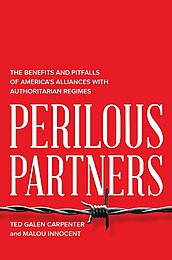American leaders have cooperated with regimes around the world that are, to varying degrees, repressive or corrupt. Such cooperation is said to serve the national interest. But these partnerships also contravene the nation’s commitments to democratic governance, civil liberties, and free markets.
During the Cold War, policymakers were casual about sacrificing important values for less-than-compelling strategic rationales. Since the 9/11 attacks, similar ethical compromises have taken place, although policymakers now seem more selective than their Cold War–era counterparts. Americans want a foreign policy that pursues national interests while observing American values. How might that reconciliation of interest and morality be accomplished?
In Perilous Partners, authors Ted Galen Carpenter and Malou Innocent provide a strategy for resolving the ethical dilemmas between interests and values faced by Washington. They propose maintaining an arm’s‑length relationship with authoritarian regimes, emphasizing that the United States must not operate internationally in ways that routinely pollute American values. It is a strategy based on ethical pragmatism, which is the best way to reconcile America’s strategic interests and its fundamental values. Perilous Partners creates a strategy for conducting an effective U.S. foreign policy without betraying fundamental American values.
